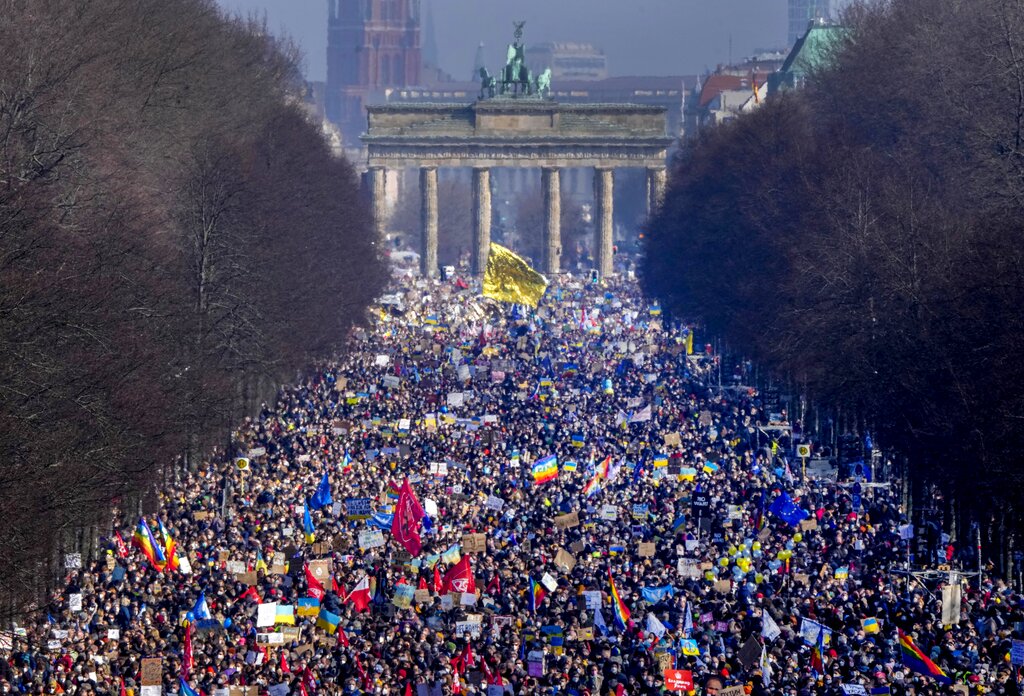The European Union plans to close its airspace to Russian airlines, fund weapons purchase to Ukraine and ban some pro-Kremlin media outlets in its latest response to Russia’s invasion, European Commission officials said Sunday.
The measures, which Commission President Ursula von der Leyen said she expected to be endorsed, would mark the first time the 27-nation bloc finances the purchase and delivery of weapons and equipment to a country under attack.
“Another taboo has fallen. The taboo that the European Union was not providing arms in a war,” said the EU’s foreign policy chief Josep Borrell.
The Commission’s plans followed the announcement earlier in the day that Germany was committing 100 billion euros ($113 billion) to a special armed forces fund and would keep its defense spending above 2% of GDP from now on. The shift underscored how Russia’s war on Ukraine was rewriting Europe’s post-World War II security and defense policy in ways that were unthinkable only a few weeks ago.
Anti-war protesters, meanwhile, took to the streets in Berlin, Rome, Prague, Istanbul and other cities — even Russian cities like Moscow and St. Petersburg and in a dozen Belarusian cities — to demand an end to the war, the largest ground offensive on the continent since WWII.
Human rights advocates reported that more than 170 people had been arrested in the Belarusian protests, even as the country’s authoritarian leader offered the country’s territory to his ally Russia. In Minsk, a large pile of flowers kept growing at the building of Ukraine’s embassy.
Tens of thousands of people massed Sunday in front of Berlin’s Brandenburg Gate, with some carrying posters with slogans such as “Hands off Ukraine,” “Tanks to Windmills” and “Putin, go to therapy and leave Ukraine and the world in peace.”
The EU’s plan to fund weapons purchases was unprecedented and would use millions of euros to help buy air defense systems, anti-tank weapons, ammunition and other military equipment to Ukraine’s armed forces. It would also supply things like fuel, protective gear, helmets and first aid kits.
The system might also use EU money to reimburse EU countries that have already sent lethal and non-lethal aid to Ukraine this year, giving an incentive for those countries to invest more in such assistance.
To bolster its military training and support missions around the world, the 27-nation bloc has set up a European Peace Facility, a fund with a ceiling of around 5.7 billion euros ($6.4 billion). Some of the money can be used to train and equip partner countries, including with lethal weapons.
Von der Leyen said beyond the weapons purchases, EU nations would shut down EU airspace for Russians — decisions that over a dozen EU members had already announced.
“We are proposing a prohibition on all Russian-owned, Russian registered or Russian-controlled aircraft. These aircraft will no more be able to land in, take off or overfly the territory of the EU,” she said.
She said the EU will also ban “the Kremlin’s media machine. The state-owned Russia Today and Sputnik, as well as their subsidiaries, will no longer be able to spread their lies to justify Putin’s war and to sow division in our union.”
Von der Leyen added that the EU will also target Belarus President Alexander Lukashenko for supporting Russia’s widespread military campaign in Ukraine.
“We will hit Lukashenko’s regime with a new package of sanctions,” she said.
German Chancellor Olaf Scholz’s announcement of new defense funding is hugely significant for Germany, which has come under criticism from the United States and other NATO allies for not investing adequately in its defense budget. NATO member states committed to spending 2% of their GDP on defense, but Germany has consistently spent much less.
“It’s clear we need to invest significantly more in the security of our country, in order to protect our freedom and our democracy,” Scholz told a special session of the Bundestag in Berlin.
Scholz said the 100 billion euro fund ($113 billion) was currently a one-time measure for 2022. It wasn’t immediately clear whether similar funding would be allocated in future years. But Scholz indicated Germany will exceed the 2% of GDP threshold going forward, signaling an overall future increase in defense spending.
A day earlier, Germany announced another major policy shift, saying it will send weapons and other supplies directly to Ukraine, including 500 Stinger missiles, which are used to shoot down helicopters and warplanes, and 1,000 anti-tank weapons.
Israel announced it was sending 100 tons of humanitarian aid — medical equipment and medicine, tents, sleeping bags and blankets — to help civilians in Ukraine. Israel also offered itself as a potential mediator during a phone call between Israeli Prime Minister Naftali Bennett and Putin, the Kremlin and Israel said. Bennett spoke also Friday with Ukrainian President Volodymyr Zelenskyy, who is Jewish.
As Greece sent more military aid, Turkish officials termed Russia’s invasion a “war,” a categorization that could lead Ankara to close down the Turkish straits to Russian warships, which Ukraine requested earlier this week. The 1936 Montreux Convention gives Turkey the right to bar “belligerent states” from using the Dardanelles and the Bosporus during wartime but provides an exception for Black Sea vessels to return to port.
On the sanctions front, Japan joined the United States and European nations in cutting key Russian banks from the SWIFT international financial banking system. Japan will also freeze assets of Putin and other top Russian officials, while sending $100 million in emergency humanitarian aid to Ukraine, Prime Minister Fumio Kishida told reporters.
